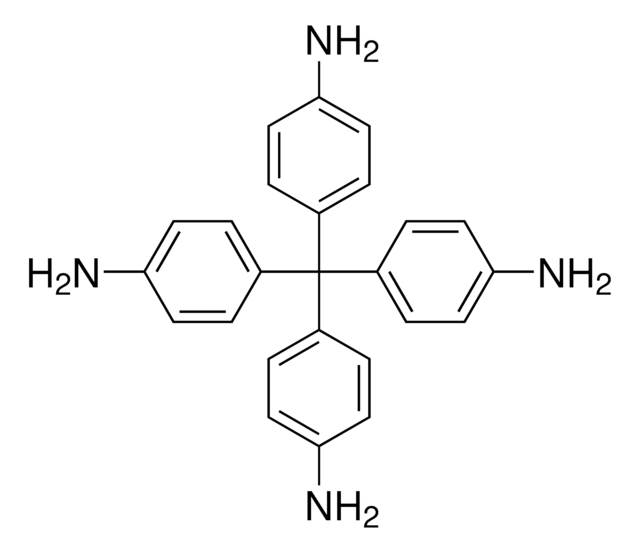421987
Bis(hexamethylene)triamine
technical grade, 40%
Synonym(s):
6,6′-Iminodihexylamine, Bis(6-aminohexyl)amine
About This Item
Recommended Products
grade
technical grade
vapor pressure
<0.01 mmHg ( 25 °C)
concentration
40%
refractive index
n20/D 1.49 (lit.)
bp
163-165 °C/4 mmHg (lit.)
mp
33-36 °C (lit.)
density
0.85 g/mL at 20 °C (lit.)
0.931 g/mL at 25 °C
SMILES string
NCCCCCCNCCCCCCN
InChI
1S/C12H29N3/c13-9-5-1-3-7-11-15-12-8-4-2-6-10-14/h15H,1-14H2
InChI key
MRNZSTMRDWRNNR-UHFFFAOYSA-N
Looking for similar products? Visit Product Comparison Guide
General description
Application
It may be used in the following studies:
- Synthesis of bis(hexamethylene) triacetamide (BHTA) by acetylation.
- As a precursors for the ZnO outgrowths on TiO2 nanofibers.
- As organic bifunctional guest molecules for {W36} polyoxotungstate host compounds to form 1D chains of directly connected {W36} cluster units.
Legal Information
signalword
Danger
Hazard Classifications
Acute Tox. 4 Dermal - Acute Tox. 4 Oral - Aquatic Chronic 3 - Eye Dam. 1 - Skin Corr. 1A - STOT SE 3
target_organs
Respiratory system
Storage Class
8A - Combustible corrosive hazardous materials
wgk_germany
WGK 1
flash_point_f
235.4 °F - closed cup
flash_point_c
113 °C - closed cup
ppe
Eyeshields, Faceshields, Gloves, type P3 (EN 143) respirator cartridges
Choose from one of the most recent versions:
Certificates of Analysis (COA)
Don't see the Right Version?
If you require a particular version, you can look up a specific certificate by the Lot or Batch number.
Already Own This Product?
Find documentation for the products that you have recently purchased in the Document Library.
Our team of scientists has experience in all areas of research including Life Science, Material Science, Chemical Synthesis, Chromatography, Analytical and many others.
Contact Technical Service


![Trimethylolpropane tris[poly(propylene glycol), amine terminated] ether average Mn 440](/deepweb/assets/sigmaaldrich/product/structures/186/658/1b1d510a-705a-4bfd-b90a-9dec80d64467/640/1b1d510a-705a-4bfd-b90a-9dec80d64467.png)







